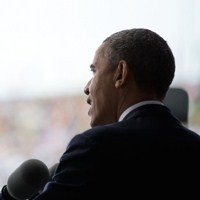President Barack Obama has delivered a consistent message during his trans-Atlantic sojourn this week, including a stirring address in Warsaw, and hit all the right rhetorical notes. To Europeans concerned that the long-announced “rebalance to the Pacific” means less U.S. attention to their continent, the president reaffirmed that European security is the “cornerstone of our own security, and it is sacrosanct.” The former Soviet-bloc countries were promised that they “will never stand alone.” Now comes the hard part: translating words into policy.
The initial signs are not encouraging. The president’s announced “reassurance plan” for European security, with a price tag of $1 billion, must be passed by Congress; it is not something that can be immediately implemented utilizing already appropriated funds. With the scandals surrounding substandard care for America’s veterans having dominated the political discourse in Washington for the past two weeks—culminating in the resignation of the secretary for veterans affairs, retired Gen. Eric Shinseki—it will be a hard political sell to explain why there are no additional funds for veterans but a spare $1 billion lying around for Europe.
Members of Congress will also be paying very close attention to what the other NATO members do in terms of increasing their defense spending and whether they will be willing to make commitments of troops and equipment to reinforce NATO’s eastern frontier. If the Canadians and Europeans find ways to avoid taking on most of the burden in terms of funds and personnel to make the reassurance of NATO’s newer members credible, there will be much less enthusiasm to once again have America fill in the gaps.

